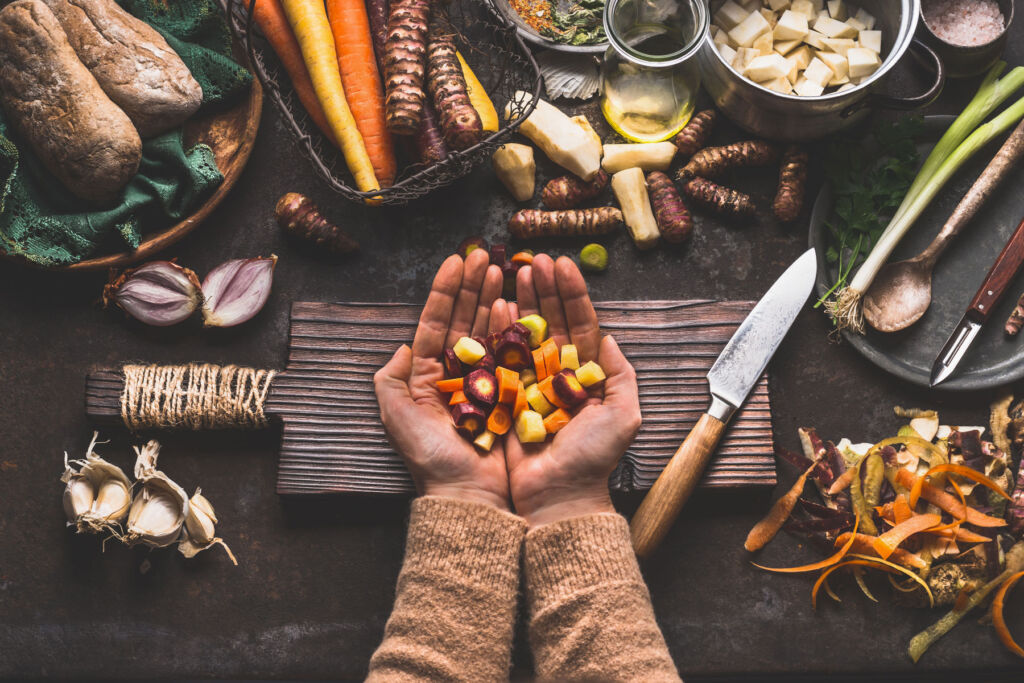
In this article, the Health & Food Supplements Information Service (HSIS) looks at why we all need to be much more nutrient savvy when it comes to keeping our immune function fit and well, along with addressing media claims and myths around supplementation.
Good nutrition is vital for overall health, including immune function. The ‘sunshine vitamin’ D (amongst other nutrients such as vitamin C, vitamin E, iron, iodine, copper, zinc and selenium) is essential for normal immune function. Public Health England recommends that everyone takes a daily vitamin D supplement providing ten micrograms daily during autumn and winter to offset our lack of sunlight.[1]
For this health feature, Dr Nisa Aslam from HSIS explains why many of us – especially the millions that fail to eat five fruit and vegetables a day – can help bridge the dietary gaps with a multivitamin and multimineral supplement.

Fewer than 1% of the UK population follow the UK Eatwell Guidance
Our daily diets need to be varied and include as many plant-based foods as possible, ensuring that we consume our 5-a-day fruits and vegetables.
GP Dr Nisa Aslam from www.hsis.org says, “Animal sourced foods, including meat, poultry, fish, and dairy should be enjoyed in moderation, or substituted for fortified plant-based alternatives if you’re veggie or vegan. A diet containing fresh, whole, unprocessed food is preferable to one high in ultra-processed foods which are typically high in sugar, salt and fat.”
Whilst many people are paying more attention to their diets, nutrient intakes fall far short of recommended intakes. People are not following government-backed healthy eating guidelines. In fact, evidence shows that fewer than 1% of the UK population follow all the 9 UK Eatwell recommendations, which is bad news for our diets and health. [2]
However, there are challenges to meeting recommended vitamin and mineral intakes through diet alone. A recent HSIS report [3] found that, for an adult woman to meet the recommended daily intake of iron (14.8mg for those aged 19-50 years [4]), they would need to eat more than a kilo (1860kcal) of grilled, lean sirloin steak, nearly 2 kilos (671kcal) of steamed broccoli, or 800 grams (1005kcal) of chickpeas [5]. That’s a lot of food and, in some cases, too many calories.
The latest data from the UK National Nutrition and Diet Survey (NDNS) and the Department for Environment Food and Rural Affairs (DEFRA) Family Food Survey summarised in a report for HSIS [6] reveal that the UK diet has improved little over recent decades. In the case of vitamin and mineral intakes – and hence micronutrient status – the situation has got worse.
Dr Nisa Aslam adds, “In particular, declines are seen in intakes of riboflavin (vitamin B2), folate (vitamin B9), vitamin A, vitamin D, iron, calcium, magnesium, iodine, selenium, and potassium. This is worrying for overall health, particularly for immune health, as all of these nutrients are essential for optimal immune function.”
Why we need to love Vitamin D
One nutrient of particular concern is vitamin D. Exposing skin to the sun (without burning) is the best way to top up vitamin D to adequate levels. While some vitamin D is naturally present in food, sources are limited, and the winter sun is at the wrong angle in the sky for vitamin D production in our skin – which in summer gives us 90% of our blood levels.
The latest NDNS data show that 11% of children, 16% of working-age adults and 13% of older adults have blood levels of vitamin D, indicating an increased risk of deficiency. This is why Public Health England recommends that everyone takes a daily 10μg vitamin D supplement from October to March, but Government survey data show that most people are not following this advice.
Vitamin D is essential for immune function and the health of bones and muscles, with emerging research also showing that vitamin D is important for cardiovascular and metabolic health.

Why we all need to be nutrient savvy
Folate (folic acid) is another nutrient of concern. Folate has a range of functions, including contributing to the health of the brain and nervous system and reducing tiredness and fatigue.
It is vital for forming red blood cells and is essential during pregnancy for neural tube development. Yet, according to data from the NDNS, 15% of teenage girls and 6% of working-age women didn’t achieve the LRNI (the level below which deficiency is more likely) for dietary folate.
In fact, 9 out of 10 women of childbearing age have blood folate levels so low that, if they became pregnant, their child would be at increased risk of neural tube defects, such as spina bifida, which currently affect one in 1000 pregnancies in the UK [7].
The NDNS shows that other nutrients of concern include calcium, magnesium, selenium, iron, iodine and omega-3 fatty acids (the special fats found in marine foods).
More than a fifth (22%) of girls aged 11-18 years and more than one in ten (11%) of women aged 19 and over are not achieving the LRNI for calcium, with potentially serious effects on bone health.
A total of 38% of 11-18-year-olds, 13% of 19-64-year- olds and 16% of those aged 65 and over are not meeting the LRNI for magnesium. More than a quarter (26%) of 11-18-year-olds, 25% of 19-64-year-olds and 36% of those aged 65 are taking in less selenium than the LRNI.
More than half (54%) of girls aged 11-18 years and more than one in four (27%) of women aged 19-64 are not achieving the LRNI for iron, increasing their risk of iron deficiency anaemia.
Over the past decade, the proportion of 11-18-year-old girls not achieving the LRNI for iodine has risen from 19% to 27%, and for women aged 19-64, from 9% to 15%. This is a particular concern among women of childbearing age, given the developing foetus’s requirement for iodine to support the normal development of brain tissue.
Oily fish is the key source of omega-3 fatty acids, which are important for overall health, including cardiovascular health. Intakes of oily fish haven’t changed much over the past decade and remain firmly below the recommended intake of 140g a week, at 56g for 19-64-year-olds and 84g for those aged 65 and over. Children aged 4-18 are eating the least oily fish, equating to a minuscule one-tenth of a portion a week.
Teenagers, especially girls and adult women, particularly those of reproductive age and people over 65, are at particular risk of these micronutrient deficiencies.

Dr Nisa Aslam continues: “Fad diets, where people avoid entire food groups, eating on the run, increased consumption of processed foods, skipping meals, and shift to plant-based diets, particularly if these are not planned and well managed, contribute to these nutrient lacks.
“Despite this rise in the number of people following plant-based diets, fewer than one-third of adults aged 19-34 consumer their recommended number of five 80g portions of fruit and vegetables a day, making it more likely that they miss out on the essential vitamins and minerals provided by these foods.”

Last word from the HSIS
In an ideal world, we should obtain all the nutrients we need from our diets, but the evidence is very clear that this is simply not happening. This makes it important to supplement our diets with a multivitamin and multimineral supplement appropriate to our age, a 10μg daily vitamin D supplement and an omega-3 supplement. Supplementation with reputable preparations can bridge these concerning gaps in our dietary intake.
References
- [1] PHE. (2016). Government Dietary Recommendations. Available at: https://assets.publishing.service.gov.uk/government/uploads/system/uploads/attachment_data/file/618167/government_dietary_recommendations.pdf
- [2] Scheelbeck P et al. (2020) https://bmjopen.bmj.com/content/10/8/e037554.abstract
- [3] Back To Basics: The Nutrients You Need, Served On A Plate; Edition 1; HSIS – Winter 2022
- [4] PHE. (2016). Government Dietary Recommendations. Available at: https://assets.publishing.service.gov.uk/government/uploads/system/uploads/attachment_data/file/618167/government_dietary_recommendations.pdf
- [5] McCance and Widdowson’s ‘composition of foods integrated dataset’ on the nutrient content of the UK food supply. Available at: https://www.gov.uk/government/publications/composition-of-foods-integrated-dataset-cofid
- [6] Back To Basics: The Nutrients You Need, Served On A Plate; Edition 1; HSIS – Winter 2022
- [7] Preventing neural tube defects | Action Medical Research
Read more food news, opinion pieces and guides here.
![]()




You must be logged in to post a comment.